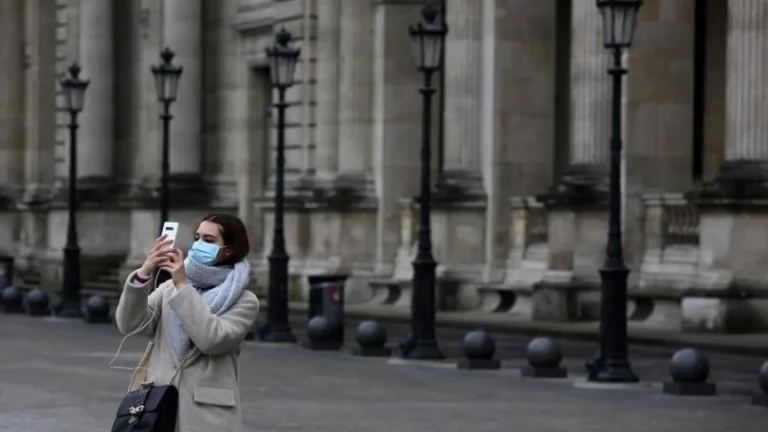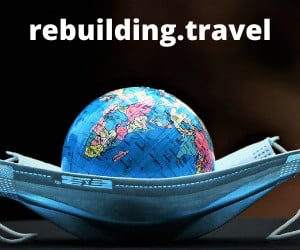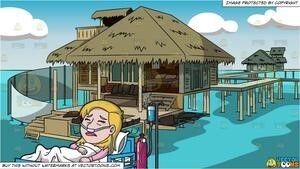“You never want a serious crisis to go to waste” Rahm Emanuel (American politician: adviser to U.S. President Bill Clinton; U.S. President Barack Obama, and former Mayor of Chicago). If not better, hotels and travel reimagined are easily different.
Not Same Same

Dr. Eran Avraham, left, and Dr. Izaak Cohen from Bar-Ilan University walk through the sanitation tunnel at the entrance to Bloomfield Stadium in Tel Aviv. Photo by Yoni Reif
Where would we be without hotels? Small hotels, inexpensive hotels, gloriously luxurious hotels… the hotel is an important part of every travel experience, regardless of the purpose or location. Before the pandemic, hotels provided one in every 25 jobs in the country (8.3 million, approximately), contributing $660 billion to the US GDP. A hotel with 100 occupied rooms per night supported almost 250 jobs in a community, generating $18.4 million in guest spending at nearby shops and restaurants. The industry generated $186 billion in local, state and federal taxes, each year. So – do we need hotels back and operational? Absolutely!
I thought that, perhaps, there would be positive societal/economic/industry outcomes to the pandemic and this new energy would be embraced by the leaders in the hotel, travel and tourism industry. There have been changes in behavior and modifications in systems; however, the question remains – have the hotel and tourism industries gone far enough to assure travelers that they have reduced the risks associated with travel during a pandemic.
Get Out of Here
People want to travel! Whether time is spent meandering through Facebook (especially Women Who Travel), or reading the research (Oliver Wyman), there is a pent-up demand for getting out and about. Global travelers seem to prefer (according to Wyman), large hotels (80 percent) over home rentals (57 percent) and US travelers are also opting for large hotels (83 percent) over home rentals (61 percent). Even the Chinese are leaning toward reservations at large properties (94 percent) with less than half (49 percent) selecting home rentals.
Select Local
The Wyman research found that those released from their quarantine/isolation are likely to select domestic travel over international visits for their next near-term holiday. Whether travelers are from China, Italy, Spain or the USA, they are staying close to their home base, which means that for the US traveler, upticks in reservations are likely to be noted by nearby states, Canada and the Caribbean while Europeans and Chinese are likely to select destinations within drive distance.
The Wyman research also found that commercial travelers are anxious to get back to business with almost 75 percent of air traveling Americans intending to travel the same (or more) for business as soon as travel restrictions are lifted and corporate business travel policy established.

NEW. What to Expect
- Touch-less Journey
From the time you begin considering a trip (business or leisure) to the time you check-out of a hotel and return home, thanks to smartphones, apps and biometrics, you never (ever) will have to interface with a human being or touch a screen. Personal ID information will be stored on the Cloud and accessible through smart phones and verified with facial recognition. Airlines and hotels will update information – from flight status, relevant border openings/closures, to room location and availability – electronically.
2. Airline lost your luggage? File your complaint via an app. Open application programming interfaces (APIs) will unlock the data needed for mobile boarding passes, baggage check-in and tagging, security, boarding, transfers and baggage claim.
3. Health Detectors at airports and hotels. Some machines will determine if you are COVID-19 positive by reading your temperature while others will also read lungs and heart.
4. Breathalyzer. An Israeli entrepreneur designed a one-minute breath test that identifies someone with COVID-19. When it receives approval from the US Food and Drug Administration it is likely to show up at airports and hotels.
5. Keep your distance. Physical distance (with the assistance of markers and technology) will dictate spacing between airline passengers and personnel, between hotel staff and guests (and other guests).
6. Getting in/out of rooms/buildings? Forget door handles, instead, wave your hand to trigger an automatic door or use a foot pedal or facial recognition.
7. Plexiglass will be everywhere, separating cashiers from customers at retail outlets, providing a barrier between airline and hotel employees and travelers and between restaurant diners and guests at the next table.
8. Forget cash and credit cards. Smartphones will be used to pay for everything.
9. Clean-up in public spaces. From multiple hand sanitizer locations to hourly disinfectant sprays, fogs and mists, CLEANING will be obvious and frequent (although the sustainability of these tasks is questionable and, over time, people may be replaced by robots).
10. Clean-up of guest rooms. Many hotels are removing all the unnecessary stuff that added clutter, germs and dust to hotel rooms. There will (thankfully) be no more decorative pillows, extra blankets, pens, pads, magazines, TV remotes, and room service menus.
11. Disinfectant will be used on just about every surface (that is visible), from door handles and light switches, to chairs and desks, thermostats, restroom hardware, windows, and closet hangers, until hotels upgrade surfaces and use anti-microbial fabrics and construction materials.

12. Food and beverage. Services may be modified or eliminated. Condiments will be single-use, cups will be disposable, many dining-in options will be replaced by grab and go and/or vending machines.
13. If room service continues, the items may be delivered to your door by a robot. You will be notified by a message on your smartphone that the robot has arrived and deposited your goodies outside your door. When you have finished dining, send an IM and the robot will return to remove the dirty dishes from your doorway.
14. Elevators. A study from Upgraded Points determine that the average hotel elevator button has 1477 times more germs than a household bathroom door handle. It also has 737 times more germs than your personal toilet seat. To address the issue, a mall in Thailand replaced buttons with foot pedals for floor selection; hopefully, hotels and commercial buildings will follow this protype. If your elevator does not have pedals, try using matchsticks, toothpicks, a ballpoint pen or the eraser side of a pencil.
15. Anti-microbial surfaces may eventually replace stainless steel and other popular building materials and be used on everything from lobbies to side tables, from restaurants to back-of-the-house counters, tables and appliances.
16. Self-cleaning surfaces. New hotels (or the properties that are being refurbished) are likely to include auto-cleaning metals in bathrooms and special resins on floor and walls that will be like Teflon for viruses…they will be unable to adhere to the surface and survive.
17. Basic room category will be eliminated and replaced with studios and suites with kitchens and laundries to reduce housekeeping and room service contact. Guests will be able to cook their own meals and wash their own sheets and towels.
18. UV light will be used to sanitize some spaces when not occupied, such as public bathrooms, at night.
19. HVAC and water delivery systems will be upgraded, improving filtration and purification.
20. Swimming pools are back on the to-do list thanks to new technology developed by a biochemist. The water is filtered to eliminate microcontaminants (i.e., viruses, bacteria, fungi) and natural compounds combined with different ultrasonic waves enable contamination to clump together for easy filtration. The water is monitored 24/7 to detect threats (tahitisbreeze).
Unique Approaches to the Challenge

Tanja Hernandez, Director of Environmental Health and Safety, Baccarat Hotel New York City
- Conference guests asked (pre-arrival) to self-identify if they belong to a risk group for COVID-19. If yes, they are asked to postpone their travels until the risk period has ended.
- Baccarat Hotel New York. Pop ID technology provides instant temperature readings that are sent to the phones of employees and department leaders. Guests and employees must wear facemasks and Baccarat designed masks are available upon request. Registered guests- only- will be permitted on the property.
- Jumeirah Al Naseem (Dubai). Rooms will remain unoccupied for 3 days after each stay or undergo a sanitary fogging process before being rebooked.
- Provides a luggage cleaning and disinfection service to guests upon arrival and suitcases are sanitized before they are delivered to rooms.
- Mandarin Oriental. Guest room bedding and linens are cleaned and changed daily; bagged in guest rooms to reduce excess contact.
- MGM Resorts. Policies include a 6-foot distance, where feasible in casinos, with floor guides as reminders. When distancing is not possible, alternate space barriers include plexiglass separators, and/or eye protection for employees.
- Montage International Hotels & Resorts/Pendry Hotels & Resorts. Guests receive 30-day membership to One Medical’s digital health services and US based associates receive annual membership. The service provides travelers access to convenient health care while away from home using on-demand video chat or secure messaging.
- Cars arriving with guests will be sanitized via a fogging machine before entering the hotel porch; valet parking available upon request. The valet sanitizes the car key and all critical touch points (i.e., door handle, car seat, driver side seat belt, gear box, gear lever) before parking with Virex II 256; solution sprayed on a clean duster and applied.
- Using UV Wands for the front desk and guest room items as well as air filters in every guest room and public areas and replaced on an escalated timetable.
- Ultraviolet light equipment used to inspect cleanliness; air duct sanitation used for each arrival and departure; weekly steam cleaning of carpets; anti-bacterial gels and soaps placed in each bathroom.
- Wiesbaden Casino (Germany). Introducing non-contact fever detection system for guests and employees to minimize infection risks and used before entering the casino.
- Provides a certified emergency medical technician (EMT) on-site 24/7 during the initial re-opening period.
Travel Bubbles

For those countries that have a mutual respect for their neighbors, a travel bubble has been established and currently in use between the Baltic states of Estonia, Latvia and Lithuania. Anyone arriving from outside these countries must self-isolate for 14 days; however, citizens can move freely within the countries. Potential bubbles include Greece, Cyprus and Israel and there may be a travel bubble between Singapore and Malaysia.
Airports

Forget bringing friends to wish you a safe and pleasant trip. Airports are probably going to restrict entrance to ticketed passengers only. Before gaining entrance to the airline terminal travelers are likely to walk through disinfection tunnels, be viewed by a thermal scanner and only those “fit to fly” will be allowed to enter the airport. Thermal cameras are already being used at Heathrow, Puerto Rico’s San Juan airport and Paine Field (Seattle). There will be touchless options for checking in through the use of biometrics (face ID). Luggage is likely to go through a fogging tunnel before it is placed on the plane.
Security check-in may be arranged by appointment in order to eliminate long lines (already in use in Montreal airport). Airports in Pittsburgh and Hong Kong are using sanitizing robots to disinfect the floors and may close overnight for additional deep cleans.
Airlines. Their Own Way

Airlines are unlikely to follow in the steps of the hotel or tourism industry. Social distancing is not on their to-do list. While Delta and JetBlue are currently blocking middle seats, this is unlikely to continue as volume increases. IATA (International Air Transport Association) is not supportive of airline social distancing as it would be a financial disaster. Air fees would have to increase up to 54 percent if regulations required blocked middle seats making planes fly at only 67 percent capacity and well under the 75-81 percent capacity required to break even.
With a serious focus on sanitation, passengers should be prepared to clean their own seat and personal space with Lysol handwipes, in addition to the airlines cleaning systems. Southwest states that every aircraft receives a 6-hour deep cleaning each evening while Delta fogs its craft between each flight. Whether this process is checked and/or sustainable places the need to optimize sanitation directly in the hands of the passenger.
Moving
People are anxious to shed isolation and get their “move on,” and the transportation of choice is likely to be by car, especially if the distance does not exceed 650 miles. In a recent Longwoods International travel – sentiment tracking study, 86 percent of travelers said they planned to visit a US domestic destination once the pandemic travel restrictions were removed. Only 8 percent said that they did not intend to travel – anywhere- for the next 6 months.

Although cycling looks like a viable option for getting out and about, the Adventure Cycling Association is discouraging cyclists from participating in long-distance bike travel at this time. The Association position is that bicycle travelers have a responsibility to avoid endangering the health of small communities and straining limited resources and, because of the “shelter in place” and quarantine orders – the availability of services are inconsistent and unpredictable.
The Association is not in a position to determine when it will be safe to take long tours; however, they have canceled their own guided tours through July 19, 2020.

To Do List
Now is a good time to start the research phase of preferred travel destinations. Click through all the online hotel sites and check-out their plans for creating a safe and sanitary guest experience. Consider local dining options and determine if their cleaning standards make you comfortable enough to make a reservation. If you plan a biking road trip, this would also be the perfect time to increase the time spent engaged with YouTube exercise videos in order to be in shape when the quarantine is lifted and you are free to go.
© Dr. Elinor Garely. This copyright article, including photos, may not be reproduced without written permission from the author.
#rebuildingtravel





